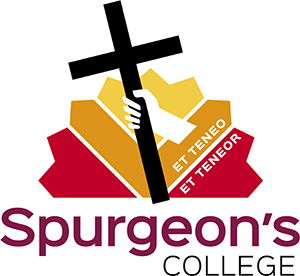What finance options are available to you?
Spurgeon’s College makes every effort to ensure our fees affordable and highly competitive.
Although the College does not offer full scholarships, there are a number of ways in which we, and others can help you pay for your course fees, living costs, travel, and study resources.
This page outlines some of the options that may be available to you.

A government funded loan
As Spurgeon’s College is a recognised publicly funded higher education provider (HEP), the first step for students seeking to fund their studies here, should be to see if they are eligible for a government funded loan from the Student Loans Company (SLC). Some but not all our full-time courses at Spurgeon’s College are eligible for this.
Financial help from the SLC usually consists of a Tuition Fee Loan and a Maintenance Loan to cover, or partially help with your study expenditures.
You may be eligible for a tuition fee and maintenance loan from the SLC if you enrol on one of the following courses at Spurgeon’s:
Undergraduate Courses
-
- BA (Hons) in Theology
- BA (Hons) in Theology with Ministerial Formation
- BA (Hons) in Theology with Chaplaincy
- BSc in Integrative Counselling
- BSc in Integrative Counselling – Top up
Postgraduate Courses
-
- MA in Christian Thought and Practice
-
- Master of Ministry
-
- MA in Digital Theology
-
- MTh (Advanced Christian Studies)
-
- MTh (Biblical and Theological Studies)
Students on these courses may be eligible for student finance from the SLC, provided they meet some additional criteria:
- Residency: you’re a UK national or have settled status, normally live in your home country, and have been living in the UK, the Channel Islands, or the Isle of Man for three years before the beginning of your course.
- Your course has to be a recognised higher education course e.g. a first degree, a foundation degree, a Higher National Diploma (HND), or an initial Teacher Training course.
- It’s your first higher education course: Although you may still get some funding if you’ve studied a Higher Education course before, but it will be limited, and you’ll have to make up any shortfall.
For more details about student finance or to apply, click here.
DSA financial support
There is also additional financial support available from the government to cover your study-related costs due to a mental health problem, long term illness or other disabilities e.g.
-
- specific learning difficulty, for example dyslexia or ADHD
-
- mental health condition, for example anxiety or depression
-
- physical disability, for example if you have to use crutches, a wheelchair or a special keyboard
-
- sensory disability, for example if you’re visually impaired, deaf or have a hearing impairment
-
- long-term health condition, for example cancer, chronic heart disease or HIV
This support is called the Disability Students’ Allowance (DSA). To find out about the help available and whether you are eligible click here.
Financial Support from the College & its Patrons
Bursaries & Scholarships
Our founder CH Spurgeon firmly believed that a lack of funds should not be a barrier to study however, all too often it is. Although we don’t have the funds to offer our courses for free, for many years we’ve operated financial support schemes which are available to students on many of our courses. These schemes are privately funded from trusts or individuals. Our Bursary Policy provides details of how students enrolled at the College can apply for a bursary or scholarship.
APP Targeted Bursaries & Scholarships
Our Access and Participation Plan (APP) sets out how we will seek to help improve equality of opportunity for underrepresented groups to access, succeed in and to progress from higher education.
As part of our APP, Spurgeon’s College is offering financial help of up to £1,000 a year to encourage applications from under-represented groups that may be at a potential disadvantage. The College’s Bursary Committee will weigh applications against each other and an award of up to £1,000 may be given to a student in each year of their undergraduate higher education programme or pathway. The Committee will take specific note of the purpose of the APP Targeted Bursaries and Scholarships, which relates to access and socioeconomic matters with a targeted focus upon students from neighbourhoods with low participation in higher education, the Index of Multiple Deprivation and Black Asian Minority Ethnic students.
Church Funding & help for Ministers in Training
Many of our students are helped by churches who offer financial support towards tuition fees or living costs during their time at Spurgeon’s College. It might be worth having a conversation with your church to see if they are able to support you in your studies.
The Baptist Union of Great Britain have produced a guide to the various ways those training for accredited Baptist ministry can fund their time at a Baptist college, which can be found here.
Charitable Trusts
There are some UK based charitable trusts which might be able to help you with funding for your studies. Please speak to the Finance Team for further information about how to submit an application to a charitable trust.
Students with Disabilities
The Snowdon Trust is a charity set up by Lord Snowdon “to help remove barriers by funding disability-related study costs so students can access and participate in their studies in further or higher education”. The Trust offers grants up to the value of £5000. Please visit their website for further information Grants – Snowdon Trust. The application deadline is normally mid-September.
NB You can only apply for funding if you have accepted your course offer for the forthcoming academic year.
Savings & Student Bank Accounts
If you can draw on savings and pay your fees upfront, it can take additional stress out of your time as a student.
Many banks offer student bank accounts, and it might be worth considering opening an account when you start your course. Normally, to be accepted for a student bank account, you will need your course place confirmed by the college. Very often interest free overdrafts over the period of your course are included as a benefit on these accounts. Make sure you read the terms and conditions of the agreement and you understand any repayment expectations on any overdrafts.



